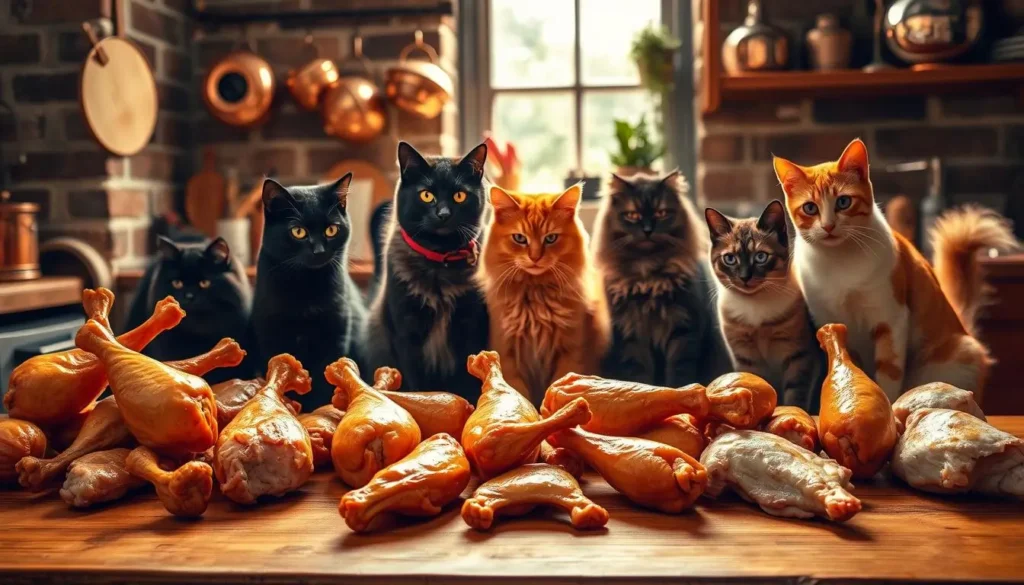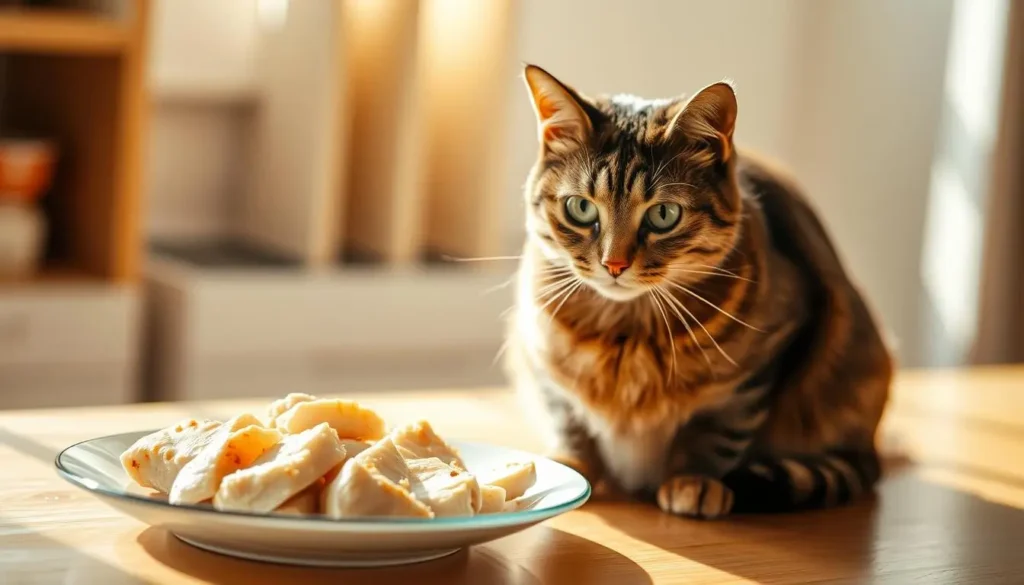Can cats eat chicken and what are the health benefits?
Every cat owner has seen their pet watch them cook chicken. They look at you with those big, pleading eyes. You might wonder, can cats eat chicken safely? The answer is yes. Chicken is not just a tasty treat for cats; it’s also very nutritious.
Is chicken good for cats? Absolutely. Cats need a lot of protein, and chicken is full of it. It helps their muscles grow, gives them energy, and keeps them healthy. Their bodies are made to digest and use animal proteins like chicken.
Table of Contents
Knowing if cats can eat chicken is more than just a simple yes or no. It’s about how to prepare it, how much to give, and its health benefits. Chicken can help your cat’s muscles grow and give them important nutrients. But, it’s important to serve it the right way.
Key Takeaways
- Chicken is a safe and nutritious protein source for cats
- Cats are natural carnivores who benefit from animal protein
- Proper preparation is key when feeding chicken to cats
- Chicken supports muscle development and overall health
- Always talk to a vet before changing your cat’s diet
Understanding Why Cats and Chicken Are a Natural Fit
Cats are natural meat-eaters with a history that shows chicken is a great food for them. Knowing their special needs and past helps us see why chicken is good for cats.
Cats and chicken have a special bond because of their hunting past. Wild cats need protein, and chicken is full of it, making it perfect for domestic cats.
The Evolutionary Connection Between Cats and Poultry
Cats are built to eat meat, thanks to their hunting past. They need animal proteins to stay healthy. Chicken is a great match for cats because it has all the proteins they need.
- Cats are obligate carnivores
- Protein is essential for their survival
- Chicken provides complete amino acid profiles
Essential Nutrients Found in Chicken
Chicken is packed with nutrients that are good for cats. It has high-quality protein that helps keep your cat healthy.
- Protein: Supports muscle development
- Taurine: Critical for heart function
- B Vitamins: Enhance metabolic processes
How Chicken Supports Feline Health
Vets say chicken is great for cats’ diets. It gives them the nutrients they need to stay healthy and strong.
Chicken helps with muscle health and keeps the immune system strong. It’s a tasty and healthy choice for your cat.
Can Cats Eat Chicken in Different Forms?

Feeding your cat chicken can be done in many ways. Knowing about the different types of chicken helps you pick the best for your cat’s diet.
Raw chicken can be a good choice, but it’s not without risks. Cats can eat it, but vets warn of dangers like Salmonella or E. coli. If you go for raw chicken, make sure it’s fresh and from a trusted source.
- Cooked chicken is usually the safest choice for cats
- Remove all bones to prevent choking hazards
- Avoid using seasonings or oils
Canned chicken is a great option for those with busy lives. Look for types with few additives and low sodium. Here are some things to keep in mind:
- Check for preserved in water (not oil)
- Verify no added salt or preservatives
- Choose plain chicken without additional flavors
Pro tip: Always introduce new food gradually and monitor your cat’s reaction to different chicken preparations.
While chicken is good for cats, it shouldn’t be the only thing they eat. Talk to your vet about how to add chicken to your cat’s diet.
The Benefits of Feeding Your Cat Chicken
Chicken is a great protein source for cats. It’s a nutritious option that supports many aspects of feline health. Knowing how cats can eat chicken shows many wellness benefits.

Feeding chicken to your cat has many advantages. It helps their overall well-being in several ways. Let’s look at how chicken can improve your cat’s health.
Protein Content and Muscle Development
Cats need a lot of protein because they are meat-eaters. Chicken is a lean, high-quality protein that helps:
- Maintain and grow muscles
- Keep a healthy body shape
- Make energy
Impact on Coat and Skin Health
The nutrients in chicken are good for your cat’s looks. Essential amino acids in chicken make their coat shiny and skin healthy.
| Nutrient | Benefit for Cats |
|---|---|
| Protein | Strengthens hair follicles |
| Omega-6 Fatty Acids | Makes skin moist |
| Vitamin B | Makes coat shine |
Digestive System Benefits
Chicken is easy for cats to digest if it’s prepared right. It helps their digestive system by providing:
- Proteins that are easy to absorb
- Low-fat nutrients
- Natural enzymes
Always talk to your vet before changing your cat’s diet. Make sure chicken is introduced safely and right.
Safety Guidelines for Serving Chicken to Cats
Feeding chicken to your cat needs careful attention to safety and preparation. Cats can eat chicken, but it’s important to do it right for their health.
Vets strongly advise against giving raw chicken to cats. Raw chicken can have harmful bacteria like salmonella and campylobacter. These can make your cat very sick.
- Always cook chicken thoroughly before serving
- Remove all bones to prevent choking hazards
- Cut chicken into small, manageable pieces
- Avoid seasoning or adding salt
If you’re wondering if cats can have raw chicken, the answer is no. Cooked chicken is safer for your cat. Cooking kills harmful bacteria and keeps important nutrients.
| Chicken Preparation Method | Safety Level | Recommended for Cats |
|---|---|---|
| Raw Chicken | High Risk | Not Recommended |
| Boiled Chicken | Low Risk | Highly Recommended |
| Grilled Chicken | Moderate Risk | Use Caution |
Start with small portions of chicken when adding it to your cat’s diet. Gradually increase the amount to ensure your cat tolerates it well. Look out for any signs of upset stomach or allergies.
Talk to your vet about adding chicken to your cat’s diet. They can give advice based on your cat’s age, weight, and health.
Potential Risks and Precautions When Feeding Chicken
Feeding chicken to cats needs careful thought. Chicken can be good for them, but owners must know the risks. They should also follow the right feeding rules.
When thinking about if chicken is good for cats, there are important steps to take. These steps help keep your cat healthy.
Common Preparation Mistakes to Avoid
- Never serve chicken with bones, which can splinter and cause internal damage
- Avoid seasoned or spiced chicken that contains harmful ingredients like garlic or onion
- Remove all skin and excess fat before serving
- Cook chicken thoroughly to eliminate possible bacterial risks
Signs of Chicken Allergies in Cats
Some cats might have allergic reactions to chicken. Look out for these signs:
- Persistent scratching or skin irritation
- Digestive issues like vomiting or diarrhea
- Excessive grooming
- Respiratory difficulties
When to Consult Your Veterinarian
Getting advice from a vet is key when adding new foods. If your cat shows any unusual symptoms after eating chicken, like sudden weight changes or digestive problems, call your vet.
Your vet can guide you on how much chicken to give and how often. This ensures your cat gets the right amount of nutrients and stays safe.
Incorporating Chicken Into Your Cat’s Diet Plan
When thinking about whether cats eat chicken, it’s key to know how to add it to their diet right. Chicken can be a great protein source for cats if it’s cooked and given the right way. Your vet can help make a meal plan that includes chicken as a healthy part.
Is chicken good for cats? Yes! Begin by adding a little plain, cooked chicken to their usual food. You can mix shredded chicken with their cat food or use it as a protein topper. Stick to skinless, boneless chicken breast and remove all seasonings and fats that could be bad for your cat.
It’s important to control how much chicken you give your cat. Chicken should only be 10% of their daily calories. Keep an eye out for any stomach issues or allergies when introducing chicken. Getting advice from a vet ensures your cat gets the right nutrients and enjoys a tasty, protein-rich meal.
Even though chicken is good, it shouldn’t be the only thing your cat eats. Cats need a mix of nutrients from special cat food. Talking to a vet nutritionist can help make a meal plan that safely includes chicken.
FAQ
Is chicken safe for cats to eat?
Yes, chicken is safe and nutritious for cats when prepared right. Cats need high-quality protein and nutrients from chicken. Make sure it’s plain, cooked well, and without bones or seasonings.
Cats can handle some raw meat, but raw chicken is risky. It may have Salmonella or E. coli. Cook chicken well to keep your cat safe.
How often can I feed my cat chicken?
Chicken should not be the main food for your cat. It should only be a small part of their diet. Talk to your vet to find out how much is right for your cat.
What types of chicken are best for cats?
Plain, skinless, boneless chicken breast is best. Avoid seasoned or processed chicken. Boiled or baked chicken without extra oils or spices is the healthiest.
Can cats eat canned chicken?
Canned chicken is okay for cats, but choose low-sodium options. Avoid those with extra seasonings or oils. Always check the ingredients and rinse to reduce sodium.
Are there any risks in feeding chicken to cats?
Risks include bacterial contamination, choking from bones, and allergies. Some cats may have digestive issues if chicken is introduced too fast. Watch for signs of allergies like vomiting or skin problems.
How should I prepare chicken for my cat?
Cook chicken without seasonings, oils, or salt. Remove bones and skin. Cut into small pieces to avoid choking. Let it cool before serving, and introduce new foods slowly.
Can chicken replace my cat’s regular diet?
No, chicken can’t replace a balanced cat food diet. It lacks essential nutrients. Use chicken as a treat or supplement, not the main food. Commercial cat foods provide all the needed nutrients.
- Dry Cat Food Brands Loved by Cats and Trusted by Vets
- Best Cat Food for Sensitive Stomach:Top 5 Vet-Approved Picks
- Special Kitty Kitten Food – Learn the Pros and Cons
- prescription cat food-Top 10 Prescription Cat Foods
- Wet Cat Food for Kittens: Top Nutritious Choices 2025
- How Long Can Wet Cat Food Sit Out? Critical Facts
- American Veterinary Medical Association (AVMA)

